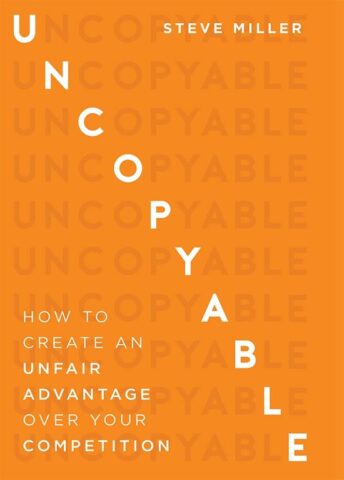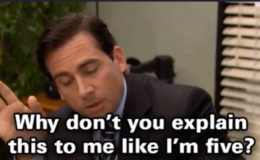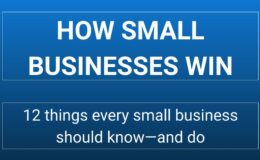How innovation and unique branding give small businesses an unfair advantage
I’ve been blessed to work with some amazing brands over the last fifteen years, many of which weren’t even around when I was born. I can still remember sitting at the large conference room table at one of the largest health equipment makers and thinking, “Wow! They trust me to handle their brand and content strategy?” Then, that same year, I was blessed to work with one of the big three social media platforms, and that was an eye-opening experience for a host of reasons—some of them rather scary.
But for as much as I enjoy working with big brands, my greatest reward is helping to educate small businesses in the areas of branding and overall marketing strategy. Sadly, too many small businesses are experts in their areas of business, but they fall short in knowing about business overall, which often has fatal consequences. I’m always on the hunt for short, detailed books that can help small business owners, and Steve Miller’s Uncopyable: How to Create an Unfair Advantage Over Your Competition is one such resource that I highly recommend.
The marketing box and how creating a unique experience helps small businesses create an unfair advantage.
The easy-to-read book breaks down, in succinct fashion, the keys to innovation, differentiation, and strategic branding needed in the marketplace today to thrive. He argues—correctly, I might add—that being better is no longer enough to make a mark; brands must focus on differentiation and build meaningful relationships with their customers.
Miller’s central thesis is that all brands operate inside a box—which is effectively your marketing segment—and because of this most of the ideas then are from inside that box as well. This has the effect of making products veritable commodities, as customers have no reason to form any associations with a given brand. They’re basically the same. He says businesses must create their own box, which creates, as he says, a Uncopyable Value Experience (UVX), or an uncopyable attachment with your customers.
The three elements that give businesses an unfair advantage

One of the book’s most illustrative examples is Miller’s analysis of the GoPro camera. Instead of entering the crowded market as simply another camera company, GoPro positioned itself as an indispensable tool for adventurers who wanted to capture and share their experiences. This play was less about creating a superior product; it was a smart positioning tactic, one that forged an emotional connection with its audience. In the process, the ubiquitous GoPro brand became, as he calls it, uncopyable by its competitors.
UVX is based around three central ideas:
- The Uncopyable Product solves customers’ problems, meets their needs, and fulfills their desires.
- The Uncopyable Process refers to delivering and supporting your offering in a way that is easy, convenient, and satisfying.
- The Uncopyable Proposition is the clear, compelling, and consistent unique brand promise you make to your customers that communicates your value and sets you apart from your competitors.
A commitment to nailing these three areas helps businesses create a UVX, he says.
How to imbue products with an unfair advantage
The three requirements for any book I’ll recommend to small business owners is it must be short, contain easily accessible information, and it must share clear, easy-to-understand examples of how to employ the tactics it outlines. Uncopyable delivers in all three areas.
One such example is what he refers to as Uncopyable Attachment, which blends branding, customer experience, and innovation to create a moat around your business. He uses the case of Harley-Davidson, whose devotees he says are not just customers but passionate brand ambassadors.
As Miller posits, the brand has nailed several key elements that worked to create a strong UVX. Those include, but are not limited to, a brand Identity that personifies freedom, rebellion, and Americana, allowing it to form deep emotional connections with its customers. Additionally, Harley has built an enviable community—Harley Owners Group (HOG)—around the brand which fosters a sense of belonging and loyalty.
Give your business a competitive edge
The key, Miller posits, lies in creating experiences and narratives that resonate on a personal level, transforming a product or service into something irreplaceable. In this way, he writes, the brand doesn’t simply sell motorcycles; they sell a fantasy and a sense of community.
Personally, as a biospych major, my favorite area of the book was where Miller discusses “stealing genius,” which is simply borrowing ideas and inspiration from completely unrelated industries to solve problems and create unique customer experiences. This approach encourages businesses to look outside their respective boxes and thus draw from a broader pool of knowledge, making it possible to be innovative in unexpected ways.
(Hint: Big brands do this all of the time, but what most people do not realize is that large brands steal their best ideas from smaller companies, often in different verticals, but who lack the ability to fully capitalize on what they created. The saying “Innovation comes from the little guys” is quite popular in product marketing circles. If they are lucky, the big brand offers to buy them; if not, they simply copy.)
Who is the book for?
I highly recommend Uncopyable for entrepreneurs and would-be entrepreneurs, in addition to marketers, and business leaders looking to carve out a sustainable competitive edge in their industries. The book does an excellent job of demystifying the process of creating a competitive brand.





